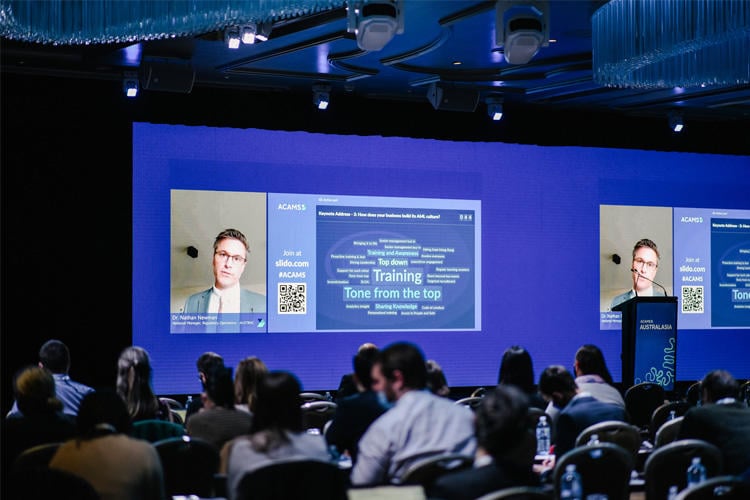Jade ThirdEye was excited to be a part of the inaugural ACAMS Australasia Conference at the Shangri-La Hotel in Sydney on the 21st and 22nd of June 2021, and in this article, we share some of the key insights and learnings from the conference.
The conference moved ahead just prior to the latest lockdowns that occurred across Sydney and was a timely reminder of the challenges that we face as a global society and as AML professionals.
Image source: acams.org
The Landscape and the Emerging Threat Environment
10 years into the commencement of the legislation, the Australasian regime is maturing, and the industry as a whole should now understand what is required to meet obligations and have the proper systems and controls in place.
“…we are past understanding what the obligations are, we are past putting in place systems and controls. We’re now in a world where the expectation is that things are operating as they should be.”
Neil Jeans, Principal Consultant at Initialism
However, as the regime starts to take a rhythm and the industry understands their obligations, the landscape continues to evolve, and the complexity of financial transactions increases with the increasing prevalence of virtual assets. Additional to the use of virtual currencies, organisations are now leveraging the crypto environment and blockchain technology in new products and services such as lending, presenting new risks which the industry needs to address and adapt to.
In addition to these changes, we are seeing more fintechs enter the market presenting its own challenges and risks. Emerging fintech’s value innovation and agility but need to make this work within the strict confines of meeting compliance regulations and in a transparent manner that can be easily communicated with regulators. Conversely more established financial institutions face their own challenges to match the speed and keep their offerings attractive to the consumer market, all while fintechs utilise their back-end infrastructure to deliver services.
One of the challenges that Neil Jeans, Principal Consultant at Initialism is seeing due to the trend of emerging fintechs and their use of established back-end infrastructure is the stretching of the transaction chains. Which creates challenges for all parties involved, including the regulator.
“…effectively as you start to stretch that transaction chain you actually start to lose the potency of intelligence because the intelligence gets further and further away.”
Neil Jeans, Principal Consultant at Initialism
Another factor to be considered is the potential criminal threat due to the pandemic over the past 12-18 months, which has evolved rapidly. Some of the major emerging threats include, stockpiling of cash and the use of bulk cash transport, a complacent online environment, and a prevalence of cyber enabled crime such as fraud, scams and the exploitation of children. Organised crime has adapted, and criminals are looking to defraud and take advantage of government programs such as the stimulus packages offered in response to the pandemic.
Dr Nathan Newman, National Manager, Regulatory Operations at AUSTRAC commended the industry, stating that the response to the changing environment has been quick and Financial Crime has remained a priority during the pandemic, as evidenced by the increase in SMR submissions.
“…we saw that through an increase in relevant suspicious matter reports being reported to us, and being able to refer them on through actionable intelligence to partner agencies…”
Dr Nathan Newman, National Manager, Regulatory Operations, AUSTRAC
Image source: acams.org
AUSTRAC is continuing to focus on Trade-Based Money Laundering, illegal wildlife trafficking, fraud including the exploitation of the NDIS, and have published Financial Crime Guides on these topics on their website.
The Regulatory Space
Andrew Hill, Head of Delegation to the FATF and APGML, Ministry of Justice, New Zealand emphasised Jeans’ point earlier with the maturing of the environment in New Zealand that the industry can move beyond foundational basics and progress to more in-depth investigations.
We’re seeing that happen across the region as supervisors focus in on different sectors. As they undergo their investigations, if a particular sector is noticed to be particularly prone to issues then more scrutiny will be applied to all members, such as what is currently happening in the casino and gaming industry. Hill has also noted common themes that translate across different sectors, with supervisors asking multiple entities what their systems are or how they approach a particular problem or topic.
Hill also highlighted that the governments, especially it seems in Australian and New Zealand are more inclined to resort to public enquiries and we’re seeing this become the go-to regulatory response to enable a fast-moving deep dive into a particular problem, resulting in much greater impact on law reforms and change.
When the audience was asked, which big/new regional trend do you think will most affect your business this year? The key themes highlighted included payments such as new payment providers, payments transformation and SWIFT payment changes; crypto and NFTs; and Tranche 2 – providing some insight into the key issues that the industry faces.
In part 2 we look at some of the key insights around compliance challenges that the industry is facing.
Get in touch with us!



